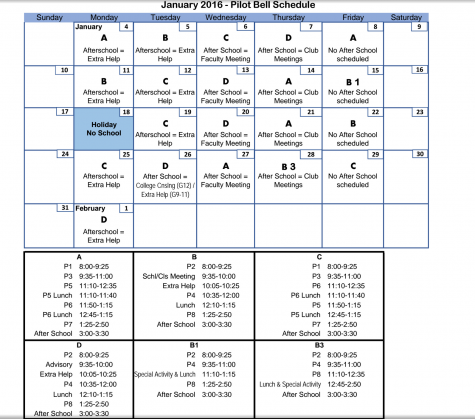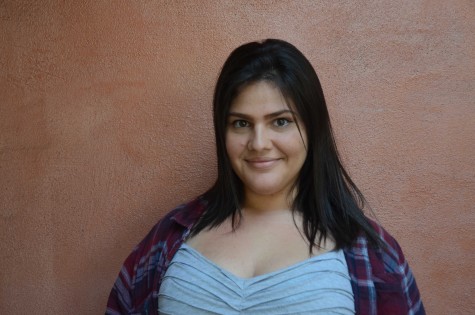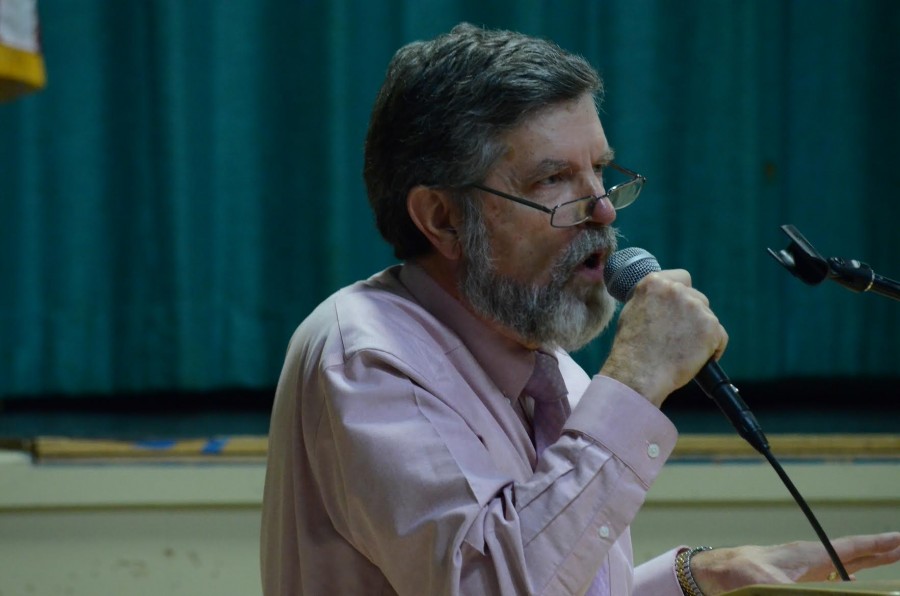New schedule to be introduced in the upper school
Daniel Hudkins, the director of information technology service and support for the upper school, announces the change of schedule at school meeting. The schedule will be piloted during the month of January and will be permanently implemented next year.
A new class schedule designed to reduce student stress will be tested in January for possible implementation in the school years ahead.
The schedule was designed by two committees of teachers as well as a team of students from the Challenge Success Club.
Two committees of staff members were created to design the schedule. The first was the Steering Committee headed by Daniel Hudkins, director of information technology service and support, and the other was the Professional Development Committee headed by english teacher John Docherty.
The Steering Committee is in charge of the technicalities of the new schedule such as making sure the math of the schedule fit the needs for Harker while the Professional Development Committee dealt with integrating and implementing the schedule to help the transition for teachers.
The schedule is designed to reduce student’s workload and stress by allowing longer breaks, having fewer classes per day and ending at an earlier time.
“The big thing was student oriented,” Docherty said. “It was to reduce the stress that all the students in the upper school were experiencing on a day-to-day basis.”
The schedule works on a rotation between A, B, C and D days. The days will rotate between the four options as shown on this calendar for January The number of classes will also rotate so no days have every class. One day will have three classes and the next will have four classes.
“I like it more since we don’t have homework every single day for each subject,” Alisa Su (10) said. “I guess after awhile the 85 minute classes will get tiring, but I think it’s better than what we have now.”

Junior Molly Wancewicz has mixed feelings about the bell schedule due to the length of the classes.
“I think that there’s some good things and some bad things, I really dislike the long block period because it’s hard enough to concentrate in the block periods you already have,” she said.
The academic day will end at 2:50 p.m every day. Extra help and college counseling will take place after the end of the school day.
Time on Thursday after school will be dedicated for club meetings.
“The basis is always trying to find an environment that we think will best permit students to learn,” Hudkins said.
The new schedule will have 10 minute long passing periods as well as having a 65 minute lunch every other day in the new schedule.
The maximum amount of homework teachers are permitted to assign will stay consistent so that students have a greater workload spread over multiple days due to the classes meeting at fewer intervals.
The committee will send out a presurvey for the students to share their thoughts on the new schedule before its test run in January.

Melina Nakos (12) is a reporter for The Winged Post. This is her third year as a part of the journalism program. She loves to spend time with the rest...


















![“[Building nerf blasters] became this outlet of creativity for me that hasn't been matched by anything else. The process [of] making a build complete to your desire is such a painstakingly difficult process, but I've had to learn from [the skills needed from] soldering to proper painting. There's so many different options for everything, if you think about it, it exists. The best part is [that] if it doesn't exist, you can build it yourself," Ishaan Parate said.](https://harkeraquila.com/wp-content/uploads/2022/08/DSC_8149-900x604.jpg)




![“When I came into high school, I was ready to be a follower. But DECA was a game changer for me. It helped me overcome my fear of public speaking, and it's played such a major role in who I've become today. To be able to successfully lead a chapter of 150 students, an officer team and be one of the upperclassmen I once really admired is something I'm [really] proud of,” Anvitha Tummala ('21) said.](https://harkeraquila.com/wp-content/uploads/2021/07/Screen-Shot-2021-07-25-at-9.50.05-AM-900x594.png)







![“I think getting up in the morning and having a sense of purpose [is exciting]. I think without a certain amount of drive, life is kind of obsolete and mundane, and I think having that every single day is what makes each day unique and kind of makes life exciting,” Neymika Jain (12) said.](https://harkeraquila.com/wp-content/uploads/2017/06/Screen-Shot-2017-06-03-at-4.54.16-PM.png)








![“My slogan is ‘slow feet, don’t eat, and I’m hungry.’ You need to run fast to get where you are–you aren't going to get those championships if you aren't fast,” Angel Cervantes (12) said. “I want to do well in school on my tests and in track and win championships for my team. I live by that, [and] I can do that anywhere: in the classroom or on the field.”](https://harkeraquila.com/wp-content/uploads/2018/06/DSC5146-900x601.jpg)
![“[Volleyball has] taught me how to fall correctly, and another thing it taught is that you don’t have to be the best at something to be good at it. If you just hit the ball in a smart way, then it still scores points and you’re good at it. You could be a background player and still make a much bigger impact on the team than you would think,” Anya Gert (’20) said.](https://harkeraquila.com/wp-content/uploads/2020/06/AnnaGert_JinTuan_HoHPhotoEdited-600x900.jpeg)

![“I'm not nearly there yet, but [my confidence has] definitely been getting better since I was pretty shy and timid coming into Harker my freshman year. I know that there's a lot of people that are really confident in what they do, and I really admire them. Everyone's so driven and that has really pushed me to kind of try to find my own place in high school and be more confident,” Alyssa Huang (’20) said.](https://harkeraquila.com/wp-content/uploads/2020/06/AlyssaHuang_EmilyChen_HoHPhoto-900x749.jpeg)



